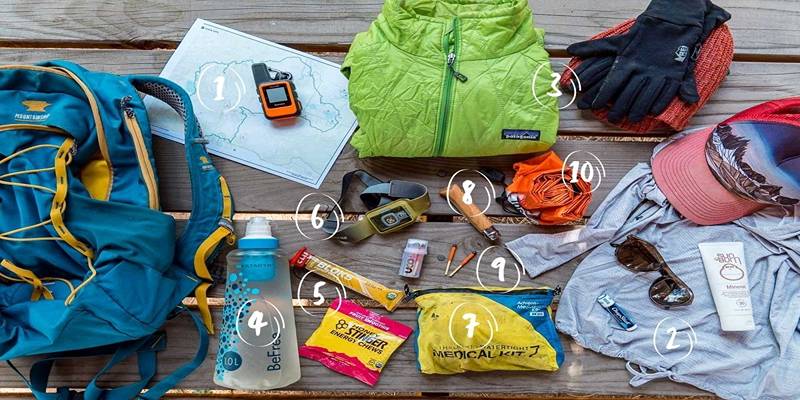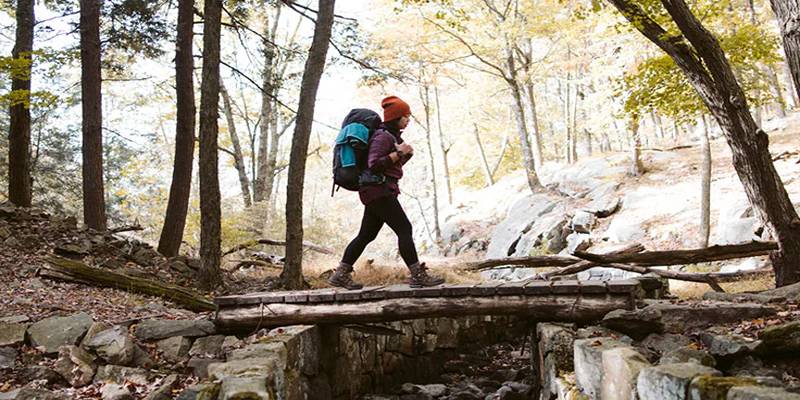How to Get Better at Hiking: Essential Tips to Prepare Before Hitting the Trail
Dec 15, 2024 By Alison Perry
Introduction
Hiking is a fun outdoor exercise that gets you in shape and helps you enjoy nature. Prepare well for your hike, whether you've done it before or this is your first time. It can make the difference between a fun and tiring experience. Before you hit the trail, you can ensure a safe and enjoyable camping experience by focusing on your health, gear, skills, and mindset. This guide will show you how to get ready for camping, build your endurance, and get ready for an incredible outdoor journey.
1. Build Physical Fitness
You'll probably have to deal with rough ground, steep hills, and long walking times when hiking. Getting in better shape will make it easier for you to deal with these problems.
Cardiovascular Endurance
Hiking demands a strong cardiovascular system to sustain energy over long distances. Focus on exercises that improve heart and lung capacity, such as:
- Walking or Running: Start with regular walks and gradually increase speed and distance. Trail running is also excellent for mimicking hiking conditions.
- Cycling: Biking builds leg strength and improves cardiovascular fitness.
- Swimming: Low-impact swimming sessions enhance stamina without putting stress on joints.
Strength Training
Strong muscles can better handle the strain of carrying a backpack or climbing hills. Incorporate exercises like:
- Leg Workouts: Squats, lunges, and step-ups to strengthen your quadriceps, hamstrings, and calves.
- Core Exercises: Planks, Russian twists, and leg raises to stabilize your body while navigating uneven terrain.
- Upper Body Training: Push-ups and rows to prepare for carrying a loaded backpack.
Flexibility and Balance
Flexibility reduces the risk of injuries, while balance helps on rocky or slippery paths. Practice:
- Yoga: A great way to enhance flexibility and improve mental focus.
- Balance Drills: Stand on one leg or use a balance board to develop stability.
2. Practice with Weighted Packs
Carrying a loaded backpack adds extra strain to your body. To get accustomed to the weight:
- Start Light: Bring a light pack during your walks or training hikes.
- Gradually Increase Weight: Add weight incrementally to mimic the load you'll carry on the trail.
- Simulate Hiking Conditions: Practice on uneven terrain or hills to prepare for real-life challenges.

3. Choose the Right Gear
The right equipment can significantly impact your comfort and safety during a hike. Test and familiarize yourself with your gear before your trip.
Footwear
- Invest in high-quality hiking boots or shoes suited to the terrain you'll encounter.
- Break in new boots to prevent blisters or discomfort.
- Pair your footwear with moisture-wicking, cushioned socks.
Clothing
- Dress in moisture-wicking, breathable layers to adapt to changing weather.
- Pack a waterproof jacket for unexpected rain.
Backpack
- Choose a backpack that fits well and provides enough space for your essentials.
- Use the pack's hip and chest straps to distribute weight evenly.
Other Essentials
- Test gear like trekking poles, hydration systems, and navigation tools to ensure they function correctly.
4. Improve Navigation Skills
Navigating confidently is essential for avoiding getting lost and staying on course. Practice these skills before your hike:
- Map Reading: Learn to interpret topographical maps and identify trail markers.
- Compass Use: Master the basics of using a compass for orientation.
- GPS Devices and Apps: Familiarize yourself with GPS technology or trail apps, but don't rely solely on them.
5. Familiarize Yourself with Trail Conditions
Research your trail in advance to understand what to expect and prepare accordingly:
- Elevation Gain: Know how steep the trail is and train for inclines.
- Trail Difficulty: Choose a trail suited to your skill level, especially if you're a beginner.
- Weather Forecast: Check the weather and plan for potential changes.
6. Pack Smart
Efficient packing is key to reducing unnecessary weight and ensuring you have everything you need. Practice packing ahead of time and include the following:
- Hydration: Carry enough water and consider a filtration system for longer hikes.
- Food: Bring nutrient-dense snacks and meals to keep your energy up.
- First Aid Kit: Be prepared for minor injuries or emergencies.
- Navigation Tools: Maps, compasses, or GPS devices.
- Emergency Supplies: Pack a whistle, multi-tool, and emergency blanket.
7. Hone Your Mental Resilience
Hiking can be physically and mentally demanding, especially on long or challenging trails. Strengthen your mental stamina by:
- Practicing Mindfulness: Use breathing techniques or meditation to manage stress and stay present.
- Visualizing Success: Imagine yourself completing the hike to build confidence.
- Embracing Challenges: Accept that discomfort is part of the experience and focus on your progress.
8. Go on Practice Hikes

Practice hikes are an excellent way to test your fitness, gear, and trail skills:
- Start Small: Begin with shorter, more accessible trails to build confidence.
- Increase Distance and Difficulty: Gradually tackle longer and more challenging trails.
- Mimic Conditions: Hike in similar environments to your planned trail, such as steep climbs or rocky terrain.
9. Learn Basic Survival Skills
While most hikes are safe, preparing for emergencies is essential. Familiarize yourself with:
- Fire Starting: Learn how to build a fire in case of an emergency overnight stay.
- Shelter Building: Understand how to create a makeshift shelter if needed.
- Animal Safety: Know what to do if you encounter wildlife like bears or snakes.
10. Plan Your Hike Thoroughly
Good planning ensures you're ready for the unexpected:
- Inform Someone: Let a friend or family member know your itinerary and expected return time.
- Check Regulations: Understand any permits, fees, or trail rules.
- Have a Backup Plan: Be prepared with alternative routes or escape options in case of bad weather or other issues.
Conclusion
Hiking preparation is more than just physical fitnessit combines gear readiness, navigation skills, mental resilience, and smart planning. By taking the time to train, practice, and plan, you'll set yourself up for a safe and enjoyable hiking experience. Remember, every hike is a learning opportunity, so embrace the journey and celebrate your progress.

Fructose Facts: Myths to Discover Its Real Impact on Health

How to Do a Side Plank Safely and What Are Its Benefits

Understanding Shoulder Acne: Why It Happens and How to Treat It

Expert Strategies in Burn Blister Care: Fundamental Do's and Common Pitfalls

Discovering the Power of Magnesium in Your Diet

Unlocking the Power of Cholesterol-Lowering Foods

Serving up healthy, high quality and local food in Victorian public hospitals and aged care facilities


